|
|
|
Sort Order |
|
|
|
Items / Page
|
|
|
|
|
|
|
| Srl | Item |
| 1 |
ID:
183671
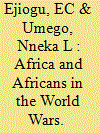

|
|
|
|
|
| Summary/Abstract |
This article argues that there is a set twin repertoires of coercion and violence that consistently characterized Europe’s involvement in Africa starting with its trans-Atlantic slave trade in which millions of able-bodied Africans were transported against their will to the New World where they were forced to labor as chattels in plantations, through the trade in produce commodities, conquest, and de facto occupation of the continent to the two World Wars when African commodity produce and manpower were impressed and utilized in the win the war efforts. Both repertoires remain handy all through the above-listed endeavors, and without them, it could have been extremely impossible for Europeans to successfully pull each one of them off. An analysis that factors both repertoires in reveals that the era of conquest and occupation of Africa flowed seamlessly into the era of World War I when the European powers that colonized Africa relied on them to impress Africans as manpower for its win the war efforts. For one to better understand each of the six endeavors, one needs to understand all six.
|
|
|
|
|
|
|
|
|
|
|
|
|
|
|
|
| 2 |
ID:
183669
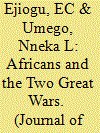

|
|
|
|
|
| Summary/Abstract |
Historically, the World Wars represented different realities for the different countries, nay nations and peoples that participated in them. Just recently, in their online daily weekday newsletter, The Morning, of September 10, 2021 a New York Times writer, David Leonhardt, observed, inter alia, that for America, “World War II helped spark the creation of the modern middle class and cemented the so-called American Century.”1 Leonhardt’s assertion are in the positive realm. For Africans, who were still subject peoples to the European powers that colonized them when both World Wars were waged, the story of the realities that they represented is most complicated, especially if it is viewed critically. Even then, any critical assessment of the two wars vis-a-vis Africa and its peoples will reveal that such a complicated story is a part of the extensive trajectory of the exploitation of the continent, its vast resources, and peoples by the former. This article and the Special Issue of the Journal of Asian and African Studies where it’s published, crack open a dedicated discourse on Africans and the World Wars by a select list of scholars who contributed articles to the Special Issue.
|
|
|
|
|
|
|
|
|
|
|
|
|
|
|
|
| 3 |
ID:
153106
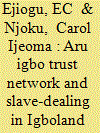

|
|
|
|
|
| Summary/Abstract |
Although existing research on trust networks shows that ethnic networks, for example, have sustained long-distance trade from the origins of cities and states onward, this article reveals that, even in the absence of connections to cities and states, by their nature and because of their commitment component, trust networks can also be uniquely customized and made to lend themselves to the peculiar enterprise that was slave-dealing in Igboland, even in contexts that are devoid of cities and states and their governmental trappings. This assertion about trust networks is substantiated in the article with an account of the effectiveness of the Aru Igbo trust network, which enabled the extensive participation of the Aru1 Igbo in the slave trade in the lower southeast Niger basin. Also, the article taps into Charles Tilly’s theoretical formulation on error correction to demonstrate that, in spite of the error, correction measures adopted by the abolitionist campaigners to bolster the purposive action that characterized the initial phase of their campaign, slave-dealing and trade in Igboland and in the lower southeast were sustained in spite of all that largely because of the durability and resilience of the Aru Igbo trust network.
|
|
|
|
|
|
|
|
|
|
|
|
|
|
|
|
| 4 |
ID:
127143
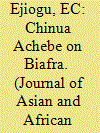

|
|
|
|
|
| Publication |
2013.
|
| Summary/Abstract |
A properly contextualized historiography in Chinua Achebe's personal history of Biafra is necessary for shaping his discourse on Biafra clearly for a better understanding. British colonial intervention was a crass endeavor that repositioned clearly distinct peoples inhabiting the parts of the Niger basin that became Nigeria in an unhealthy social, economic and political arrangement that enabled the series of unfortunate events that included the pogroms of the Igbo and, of course, the genocidal Biafra war.
|
|
|
|
|
|
|
|
|
|
|
|
|
|
|
|
| 5 |
ID:
183679
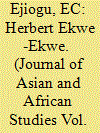

|
|
|
|
|
| Summary/Abstract |
The brilliant and erudite scholar and public intellectual of the state, genocide and ‘wars in Africa in the post-1966 epoch, beginning with the Igbo genocide, 29 May 1966 to 12 January 1970’, which he aptly designated as ‘the foundational and most gruesome genocide of post (European) conquest Africa’, Herbert Ekwe-Ekwe, who passed in 17 October 2019, was one of the select slate of scholars who were invited to contribute to this Special Issue of the journal. Characteristic of him and his dedication to the seriousness of purpose in scholarship, he was the first to complete and submit his contributed piece, which appears here in the Special Issue under the title, ‘Africans had no business fighting in either the 1914–1918 war or the 1939–1945 war’. That was a mere 4 months prior to his passing. This is a deserving tribute to him that captures his scholarship in all of its essence and complexity – Ekwe-Ekwe wrote more than 15 insightful books and published numerous articles in top-ranked academic journals and general interest publications in both the English and Portuguese languages, all of which are well-received in the communities of scholars and lay people. Rethinking Africa is the ‘forward looking blog’ that he founded and ‘dedicated to the exchange of innovative thinking on issues affecting the advancement of African peoples wherever they are’. It is indeed a medium that he used to provide ‘rigorous and insightful analyses on the issues affecting Africans and their vision of the world’. He was until his transition a ‘visiting professor in graduate programme of constitutional law at Universidade de Fortaleza, Brazil’.
|
|
|
|
|
|
|
|
|
|
|
|
|
|
|
|
| 6 |
ID:
127493
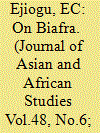

|
|
|
|
|
| Publication |
2013.
|
| Summary/Abstract |
Biafra and the tragedy it represents for humankind is compounded by the official code of silence that Nigeria's military decreed in the 1970s to ensure that the Biafra-Nigeria war is not taught in schools in Nigeria. Scholars and intellectuals are obligated to subvert that code of silence in order to educate humanity on the tragedy and the atrocities that led to it. Chinua Achebe's There Was a Country: A Personal History of Biafra (Penguin, 2012) and his transition March 21 2013 provided one such opportunity for scholars and concerned intellectuals alike.
|
|
|
|
|
|
|
|
|
|
|
|
|
|
|
|
| 7 |
ID:
113759
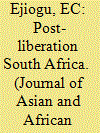

|
|
|
|
|
| Publication |
2012.
|
| Summary/Abstract |
The written history and narratives of the anti-apartheid liberation struggle in South Africa has been cast, albeit erroneously, as if it was waged and won solely by the African National Congress (ANC), its ally the South African Communist Party (SACP), and the Congress of South African Trade Unions (COSATU), the three alliance partners that have held the reins of state power since the first multi-racial democratic elections in 1994. The truth is that the Pan-Africanist Congress (PAC) of Azania, the Azania People's Organization (AZAPO), the New Unity Movement (NUMO), and several other liberation movements played significantly vital roles in that struggle. The ensuing discourse puts this state of affairs on the PAC's diminished status in the politics of post-liberation South Africa, which derives partly from its radical antecedents from its inception that placed it apart from the ANC from which it split in 1959, earned it immediate proscription from the apartheid stage before it could root itself properly as well as notoriety in the West. The discourse argues and concludes that a more comprehensive narrative and written history of that struggle will benefit the on-going quest for the transformation of South Africa's multi-racial democracy and the course of democracy in the rest of Africa.
|
|
|
|
|
|
|
|
|
|
|
|
|
|
|
|
| 8 |
ID:
183676
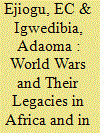

|
|
|
|
|
| Summary/Abstract |
This article drew from prominent Kenyan novelist-writer, Ngúgí wa Thiong’o’s personal history on the World Wars and their legacies in Africa and on the affairs of Africans, with a focus on East Africa, and especially his country of Kenya. Ngúgí, whose birth in 1938 and childhood years were on the cusp of the World War II (WWII), reveals that the likes of his father who dodged conscription into Britain’s Carrier Corps in the first War, and the conscription of his two elder brothers—one of whom died in service while the other returned home alive—for military service in WWII constitute significant and relevance issues for careful exploration on the subject matter of both World Wars and their legacies on the African continent. So are the various actors whose advent as actors in the affairs of Africans and others in East Africa is directly linked to World Wars I and II. Those would include the likes of Carey Francis, who came on in 1940 as the principal of the exclusive all-boys Alliance High where a generation of Kenyans that included Ngúgí received British-style public school education, Evelyn Baring, the then colonial governor-general of Kenya who superintended the imposition of the State of Emergency in Kenya, in the period 1952–1959, and even Idi Amin, a rank and file African enlistee in the King’s African Rifles (KAR) in the aftermath of the World War II. Amin and his ilk were deeply involved in the highly repressive British-led campaign during the State of Emergency in Kenya that led to the death of many of their fellow Africans. It is also noteworthy that as a soldier and subsequently, Amin became a central actor in the politics of post-independence Uganda sequel to his overthrow of Milton Obote’s government in a 1971 military coup d’état. The spiraling violence that Amin’s advent enhanced in Uganda’s body politic remains a recurrent feature of governance in that East African state. The analytical reconstruct that emerged in the article is illuminated with elements of C. Wright Mills’ age-old and all-time relevant original theory-rich methodological construct, “the sociological imagination” as the theoretical framework.
|
|
|
|
|
|
|
|
|
|
|
|
|
|
|
|
|
|
|
|
|